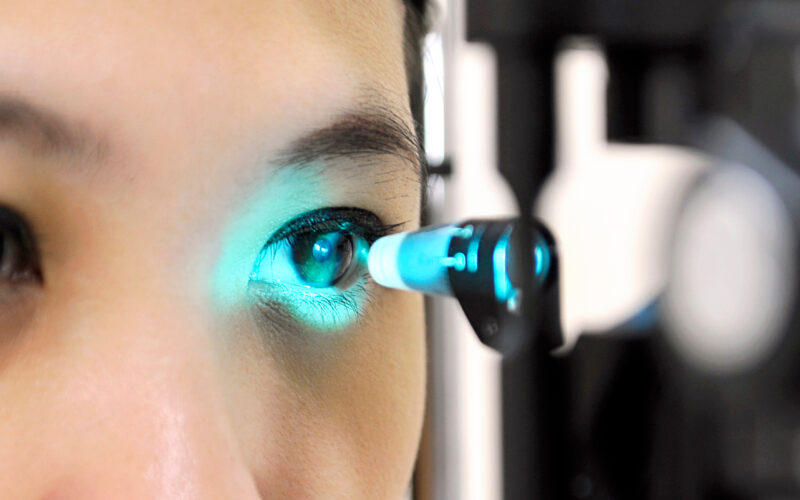For the most part, side effects from birth control will stop once a person is off the Pill. Spotting will clear up, mood issues will subside, and weight will be easier to manage. However, new research has tied hormonal birth control use to an increased risk of developing glaucoma, which has no symptoms in its early stages and can lead to irreversible vision loss. For women with a predisposition to developing vision problems, this risk could lead to a dark future indeed.
Glaucoma and… hormonal birth control?
Glaucoma is the second-leading cause of blindness worldwide after cataracts, and it affects 3 million people in the United States alone. According to the American Association of Ophthalmologists, glaucoma is defined as vision problems related to optic nerve damage, usually caused by excess fluid in the eye that increases intraocular pressure or IOP (the pressure within the eye). As the optic nerve becomes damaged due to this increased pressure, a person will experience blind spots in their vision. Regrettably, these blind spots may not be noticeable until most of the optic nerve fibers have already been irreversibly damaged. In about 5% of cases, glaucoma progresses to blindness, according to the Glaucoma Research Foundation. Glaucoma is a leading cause of blindness in adults over age 60, the Mayo Clinic reports.
Because of the lack of early symptoms, it is estimated that half of people with current glaucoma have not yet been diagnosed. Consequently, it is important to receive a comprehensive eye exam before extensive damage has taken place, particularly if you are at increased risk of developing glaucoma.
Risk factors for developing glaucoma include:
- Being over the age of 40
- Having family history or glaucoma or personal history of other vision issues
- Being of African, Hispanic, or Asian descent
- Having been previously diagnosed with high eye pressure, a thin cornea, or a thinned optic nerve
- Having used steroids for a long period of time
- Medical conditions such as diabetes, migraines, high blood pressure, and poor circulation
- And… being on hormonal birth control?
Estrogen and the eyes
Keep in mind that hormones are transported via the bloodstream to every organ system in the body and can have many different effects on different kinds of tissue. Estrogen, in particular, has a wide range of effects throughout the body, including in the “retinal ganglion cells (RGCs), lens epithelial cells, corneal epithelium, ciliary body and iris stroma (4–7)” of the eyes [1]. Changes in estrogen levels, then, could logically impact vision.
Accordingly, sustained shifts in estrogen levels, such as during pregnancy, menopause, or when starting hormonal birth control, are known to cause changes in vision. Furthermore, increased estrogen can cause eye inflammation that disrupts the oil-producing glands in the eye, leading to dry eyes. A normal, adequate level of estrogen is specifically considered protective against glaucoma.
How does hormonal birth control (HBC) affect the eyes?
The synthetic estrogen in HBC can cause the cornea to thicken, which can cause blurred vision [1]. And, although very rare, some forms of HBC have been known to increase pressure within the skull (or intracranial pressure, ICP) causing intracranial hypertension, also known as pseudotumor cerebri, which can also damage the optic nerve and even cause vision loss. More likely to occur are dry eyes and/or blurred vision [2].
How might HBC use specifically increase a woman’s glaucoma risk?
In a 2016 study of over 3,000 women aged 40 and over, hormonal birth control use for three or more years was found to nearly double a woman’s risk of developing glaucoma, and HBC use for less than three years was associated with a 1.56x increase in risk compared to women who had never used HBC [3]. The study controlled for the normal risk factors for developing glaucoma, as well as for conditions that would further impact hormone levels such as having had hormone replacement therapy (HRT) and the ages of menarche (first period) and menopause.
The study authors noted that their findings of hormonal birth control increasing the rate of developing vision issues seemed at first glance at odds with other studies suggesting that estrogen has a protective effect against the development of glaucoma. The researchers proposed that since HBC keeps hormone levels relatively constant most of the time, the body is deprived of the natural, beneficial fluctuations of endogenous (naturally occurring) estrogen that occur throughout a normal cycle.
The study itself puts it quite well:
“More importantly, none of the existing OCs [oral contraceptives] on the market act exactly like the physiological hormones during the menstrual cycle. We therefore hypothesize that OC use significantly changes the natural daily, or even hourly, variations in hormone levels which may be important in the pathogenesis of glaucomatous diseases.”
The way the female body’s natural reproductive hormones fluctuate throughout the cycle is crucial to whole-body health in a number of ways, from brain health, to breast health, to immune system function, which we explore further in our Reasons Women Need Periods series.
2016 study backs up other research connecting HBC use to glaucoma development
The 2016 study’s primary limitation was that it relied on self-reports of glaucoma incidence, rather than objective verification of glaucoma diagnosis [3]. But the study corroborates earlier research finding that five-year or greater use of oral HBC “was associated with a 25% increased risk of primary open angle glaucoma,” the most common type of glaucoma [4]. Furthermore, a 2021 study similarly found that current use of either oral or non-oral forms of HBC was associated with increased incidence of glaucoma, though the overall risk was low [5].
So… will hormonal birth control use cause you to go blind?
In short, probably not. Amongst adults over age 40, glaucoma incidence is around [4][6]. That means that we can estimate the odds of developing glaucoma later in life to be around 2%, although your personal risk will be higher or lower depending on the type and number of risk factors that you have. In the study mentioned above, the odds of developing glaucoma were about double for people who had used HBC for three or more years compared to those who have never used HBC. If we accept 2% as a sort of “base risk,” then long-term HBC users would have an approximately 4% chance of developing glaucoma in their 40s or later.
However, this study did not evaluate other intervals of HBC use besides more than three years or less than three years; consider that women who start hormonal birth control in their early teens can be continuously without their natural menstrual cycle for ten or more years! Furthermore, without getting a comprehensive eye exam (which folks who do not wear corrective lenses are probably less likely to do), there is no way to know if you have a greater disposition for developing glaucoma based on factors such as eye pressure or optic nerve thickness.
Package inserts for hormonal contraceptives don’t mention the possibility of glaucoma
Interestingly, a blood clot in the eye is the only potential eye-related adverse effect listed in the Food and Drug Administration (FDA) patient package insert for popular hormonal birth control pill Ortho Tri Cyclen. The insert for Lutera, another popular oral contraceptive brand, reports intolerance to contact lenses as a possible side effect. The insert instructs contact lens-wearers to notify their doctor if they notice a change in vision. The insert also acknowledges that cataracts and “optic neuritis, which may lead to partial or complete loss of vision” have been observed in oral contraceptive users, though it’s unclear whether the contraceptive was the culprit.
Opening peoples’ eyes to the benefits of fertility awareness
While hormonal birth control works against the female body, and women are expected to simply manage the side effects that crop up with its use, fertility awareness enables women to work with their bodies to plan their families or manage reproductive-related issues. Fertility awareness users learn how to track and understand the natural hormone shifts that occur each month, using their own observable health data to avoid or achieve pregnancy.
Certainly, optometrists and ophthalmologists should make their patients on hormonal birth control aware of the risk of dry eyes, blurred vision, and glaucoma. At Natural Womanhood, our greater hope is that research like this continues to help both doctors and patients understand the important role a normally functioning reproductive system plays in whole body health.
This article was updated on May 16th, 2023 to clarify that patient package inserts for popular oral contraceptives do not mention glaucoma or dry eyes as possible adverse effects.
References:
[1] Shaaban, Yasmine Maher, and Tamer Abdel Fattah Badran. “The effect of oral contraceptive pills on the macula, the retinal nerve fiber layer, the ganglion cell layer and the choroidal thickness.” BMC ophthalmology vol. 19,1 250. 10 Dec. 2019, doi:10.1186/s12886-019-1263-2 [2] He, Bonnie et al. “Effects of hormonal contraceptives on dry eye disease: a population-based study.” Eye (London, England) vol. 36,3 (2022): 634-638. doi:10.1038/s41433-021-01517-x [3] Wang YE, Kakigi C, Barbosa D, Porco T, Chen R, Wang S, Li Y, Singh K, Pasquale LR, Lin SC. Oral Contraceptive Use and Prevalence of Self-Reported Glaucoma or Ocular Hypertension in the United States. Ophthalmology. 2016 Apr;123(4):729-36. doi: 10.1016/j.ophtha.2015.11.029. Epub 2016 Feb 11. PMID: 26948305; PMCID: PMC4857187. [4] The Eye Diseases Prevalence Research Group*. Prevalence of Open-Angle Glaucoma Among Adults in the United States. Arch Ophthalmol. 2004;122(4):532–538. doi:10.1001/archopht.122.4.532 [5] Hogden K, et al. “The association between hormonal contraceptive use and glaucoma in women of reproductive age.” British Journal of Clinical Pharmacology, vol. 87, issue 12 (2021): pp. 4780-85. https://doi.org/10.1111/bcp.14920 [6] Allison K, Patel D, Alabi O (November 24, 2020) Epidemiology of Glaucoma: The Past, Present, and Predictions for the Future. Cureus 12(11):e11686. DOI 10.7759/cureus.11686
Additional Reading:
The disturbing connection between your birth control and vision problems
Blood clots and hormonal birth control
Social media’s reckoning with #naturalbirthcontrol
10 reasons to consider getting off birth control and starting fertility awareness instead







